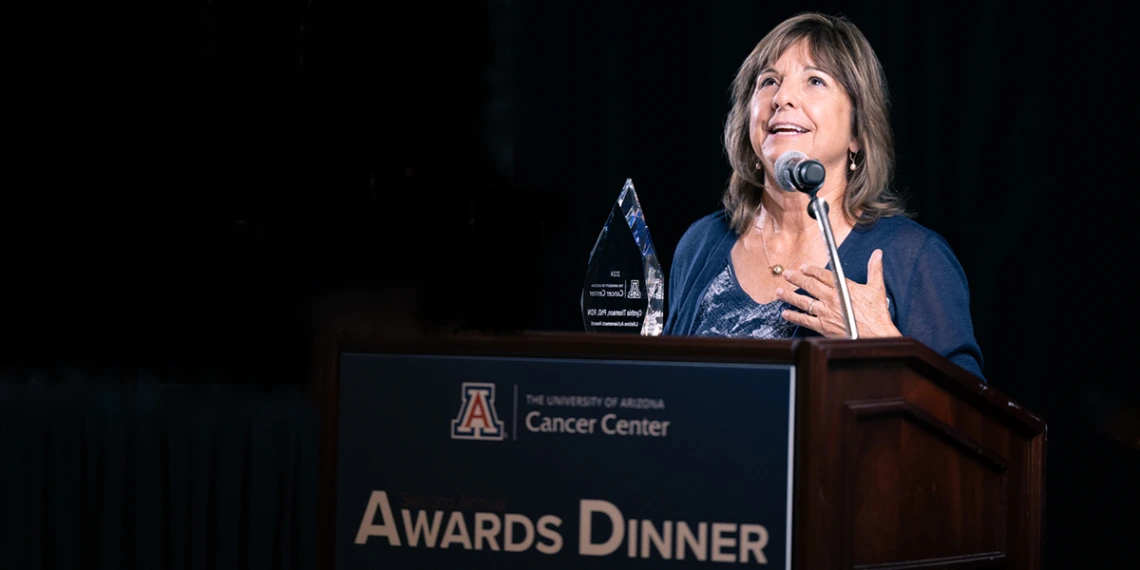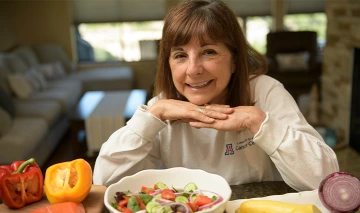Where the wild food grows

Cynthia Thomson, PhD, accepts her Lifetime Achievement Award at this year's UACC Awards Dinner.
Cynthia Thomson brings healthy eating and cancer prevention to the table
Who exemplifies a groundbreaking cancer researcher and mentor in cancer prevention and control?
For several decades at the University of Arizona Comprehensive Cancer Center, that person has been Cynthia Thomson, PhD, RD, who has changed the lives of patients, cancer survivors, students and colleagues through her passion for cancer prevention and compassion for people.

Authoring more than 300 peer-reviewed journal articles, 33 book chapters, and 24 books, handbooks, and technical reports, Thomson has made incredible strides in cancer prevention and control. Her seminal contributions to national standards include leadership in American Cancer Society nutrition and physical activity guideline development for cancer prevention and guidelines for cancer survivorship.
And according to her colleagues, she does it all with humility and grace that make them feel welcomed and respected.
Building a legacy of connected collegues
Thomson recently retired as a professor of Health Promotion Sciences, director of the Zuckerman Family Center for Prevention & Health Promotion, and a University of Arizona Distinguished Outreach Faculty member.
“Dr. Thomson has raised the bar through her own work and serving UACC,” said Robin Harris, PhD, co-director of the U of A Skin Cancer Institute. “With her deep focus on nutrition, she has designed large and small intervention studies, participated in large national studies, and has now become an expert in dissemination sciences. She has been extraordinarily active in working with community and state groups around cancer prevention and with survivors.”
Thomson’s roles at the U of A Cancer Center included serving as leader of the Cancer Prevention and Control Program, associate director for Population Sciences, and director of the Behavioral Measurement and Interventions Shared Resource for many years.
The Cancer Prevention and Control Program earned the highest score, Outstanding to Exceptional, at the last renewal due to her leadership with Sherry Chow, PhD. The UACC CPC Program was highlighted at the 2023 American Society for Preventive Oncology national meeting, also because of Thomson.
To further support her peers, Thomson has served as a reviewer for journals through the National Cancer Institute and other National Institutes of Health grant applications and foundation-based grant applications throughout her career.
“She represents the consummate Cancer Prevention and Control scientist and leader,” said Jennifer Bea, associate professor, Health Promotion Sciences and co-leader of the Cancer Prevention and Control Program. “Dr. Thomson has contributed significantly to the literature, to the training of the next generation of scientists and health professionals, and to shaping our cancer center initiatives, as well as national cancer prevention and control guidelines.”
Finding her way into cancer prevention and control
Thomson’s journey to building a prolific career at the U of A Cancer Center started in western Pennsylvania at home with her mom.
“When I grew up, my mom always had a garden. She always made everything from scratch,” Thomson said. “She taught us to eat healthy, but I hadn't really thought about it. We didn't have fast food. We ate out on our birthdays, and that was it.”
While attending Western Virginia University, she took a biochemistry class and became enamored with the field, which led her to become a registered dietitian.
“Biochemistry is central to nutrition—it’s what you eat, and what happens to it when you eat it. How does nutrition influence that body function? I was just so fascinated. It was my favorite class,” she said.
Following summer travel after her college graduation, Thomson landed in Tucson and began her career at the University of Arizona in 1986 as a clinical nutritionist. She quickly became the chief dietitian of what was then called the University Medical Center while earning her master’s in nutritional sciences. She earned her doctorate in nutritional sciences in 1998.
Thomson joined the University of Arizona Cancer Center more than 35 years ago through David Alberts, MD, former director who had cancer prevention studies waiting for her.
“I always appreciated not just his intellect, but his willingness to think outside his lane and his career to really foster other people,” Thomson said. “I think he really understood that if people around me are successful in combating cancer and helping people to prevent this disease, we all win.”
Thomson, along with other U of A researchers, led the largest national study of lifestyle behaviors in ovarian cancer, one of the more lethal cancers diagnosed in women. The Lifestyle Intervention for Ovarian Cancer Enhanced Survival, referred to as LIvES, the first study to test the role of diet and activity in increasing survival after an ovarian cancer diagnosis.
She also served as the principal investigator of two important breast cancer survivorship intervention studies: the Women’s Intervention Nutrition Study and the Women’s Healthy Eating and Living Study.
Thomson was the Arizona site principal investigator for the Women’s Health Initiative Vanguard Clinical Centers. This landmark study supported Thomson’s work and aided mentorship of students, postdocs, and new faculty.
Embodying the cream of mentorship
With a dedication to building the next generation of cancer prevention and control scientists, Thomson has had more than 70 mentees during her career and has made life-changing investments in their careers. She has mentored trainees from undergraduate through early-stage investigators on awards like the STEP-UP summer training, Cancer Prevention and Control Postdoctoral Fellowship Program, and National Institutes of Health Research Career Development Awards, called K awards, in addition to one-on-one mentorship in her lab and community projects.
“The long list of trainees includes me, once a post-doctoral mentee and now a well-funded NCI researcher, CPC co-leader, and BMISR director,” said Bea, who has been mentored by Thomson for nearly 20 years and is now the shared resource director for the center’s Behavioral Measurement and Interventions Shared Resource. “Dr. Thomson provides stepwise challenges with support, targeted readings, and hands-on experiences across disciplines including clinical trials, community outreach, biomarker work, and care, and dissemination through writing and presentations.”
Thomson said it is important for students to have the right teams around them and have opportunities to attend conferences and get inspired by the science that fuels their field.
“I think one of the most important things as a mentor is just making sure people have the time, and take the time, to really reflect on why they are where they are,” she said.
For former mentee Tracy Crane, PhD, RDN, that advice was Thomson’s living example in 1998. Crane observed Thomson serving as her mentor yet balancing that work with earning her doctorate and raising two boys while remaining curious, engaged and kind.
Crane is now the director of Lifestyle Medicine, Prevention and Digital Health Sylvester Comprehensive Cancer Center at the University of Miami and an associate professor in medical oncology and public health.
“Thomson changed my life professionally and personally, Crane said. “She is someone I hold in the highest regard as a scientist and mentor. .In academia, there are few women who achieve the success and influence she has had on a field and at the same time be a role model to follow as a mother and wife – I work to model the things she has taught me daily. She mentors with the strongest scientific rigor, but never forgets to remind you that life is so much more than the grants we write and studies we publish and to keep it all in perspective and balance.”
Perseverance is key to the field, especially in achieving funding or getting published, according to Thomson.
“None of this comes easy,” she said. “In academia, I still have papers rejected. It happens, and so you have to kind of go, ‘you know, this is the world that I've decided to go into.’”
Thomson mentored David Garcia, PhD, for 11 years as a post-doctoral scholar, junior faculty, and served as primary mentor on his K-award. Garcia is now an associate professor in the Mel and Enid Zuckerman College of Public Health,
“Maya Angelou once said, ‘I’ve learned that people will forget what you said, people will forget what you did, but people will never forget how you made them feel,’” Garcia said. “Anyone who knows Dr. Thomson can recognize that she is an amazing scientist, collaborator, colleague, and leader in the field of cancer prevention and control. As she approaches her retirement, I can only reflect on how she makes people feel – welcomed and respected.”



